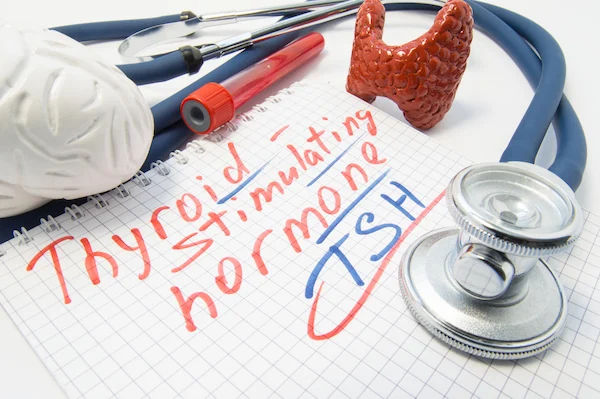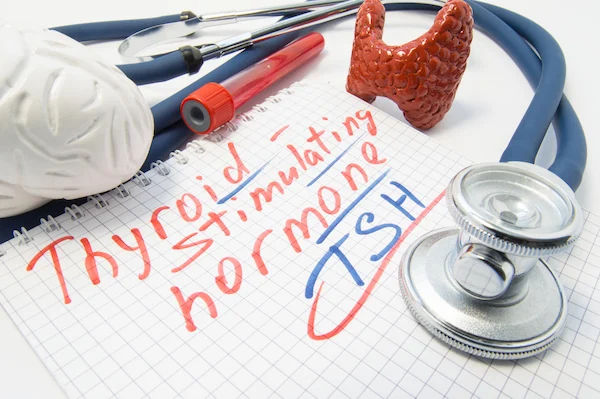Excessive Sweating Without Exercise? Test These Markers
Sweating excessively even when you're not active? It could signal underlying health issues. Learn which tests, like thyroid, blood sugar, and hormone panels—can reveal the cause and guide treatment.

Written by
Last updated on 31st Jul, 2025

We all sweat. It's our body's natural way of cooling down when we exercise, in hot weather, or when we're nervous. But what if you find yourself sweating a lot, even when you're not active, stressed, or in a warm place? This can be more than just annoying; it can be embarrassing, uncomfortable, and even a sign that something's not quite right inside your body. If you're an adult between 20 and 45 and experiencing sweating without a clear reason, it's worth finding out why.
Understanding Why You're Sweating Too Much (Hyperhidrosis)
Excessive sweating, known medically as hyperhidrosis, can affect your hands, feet, armpits, face, or even your whole body. Some people have what's called primary hyperhidrosis, where there's no clear cause, and it often runs in families. Others have secondary hyperhidrosis, meaning the sweating is a symptom of another medical condition. We'll focus on this secondary type, as tests can often reveal the root cause.
Several health conditions can lead to sweating a lot without exertion:
- Thyroid Problems
- Blood Sugar Issues
- Hormone Changes
- Anxiety and Stress
- Certain Medicines
- Other Conditions, like infections, nerve conditions, or certain types of cancer.
If you're sweating excessively without a clear reason, you should talk to a doctor. Tests are key to moving past guesswork and finding out exactly why you're sweating.
How Tests Can Help: Finding the Hidden Causes
Tests give doctors clear facts about what's happening inside your body, helping them pinpoint the exact reason for your symptoms. For adults who sweat a lot without an obvious reason, specific blood tests can offer vital clues about their body's metabolism and hormone levels. This information is crucial for creating a plan tailored just for you to manage your sweating and improve your quality of life.
Here, we'll look at key tests that are especially helpful when investigating unexplained excessive sweating: Thyroid Function Tests, Blood Sugar Tests, and sometimes a Hormone Panel.
Thyroid Function Tests
Thyroid function tests measure the levels of hormones made by your thyroid gland, a small gland in your neck. These hormones (mainly Thyroxine or T4, and Triiodothyronine or T3) are vital for controlling your body's metabolism, energy levels, and temperature. Thyroid-stimulating hormone (TSH), made by the pituitary gland, tells the thyroid what to do.
Key Tests and What the Results Mean:
The most common thyroid tests include:
TSH (Thyroid-Stimulating Hormone): This is often the best first test to check for thyroid problems.
- Normal Range: Usually between 0.4 to 4.0 mIU/L.
- Low TSH with high T3/T4: Points to hyperthyroidism (overactive thyroid).
- High TSH with low T3/T4: Points to hypothyroidism (underactive thyroid), which usually doesn't cause excessive sweating.
Free T4 (Free Thyroxine): Measures the amount of active T4 hormone in your blood.
- Normal Range: Slightly varies by lab, typically 0.8 to 1.8 ng/dL.
- High Free T4 with low TSH: Confirms hyperthyroidism.
Free T3 (Free Triiodothyronine): Measures the amount of active T3 hormone.
- Normal Range: Slightly varies by lab, typically 2.3 to 4.2 pg/mL.
- High Free T3 with low TSH: Also confirms hyperthyroidism, especially if only T3 is high.
Book a Thyroid Function Test now
Blood Sugar Tests
Blood sugar tests measure the amount of glucose (sugar) in your blood. Glucose is your body's main energy source. Keeping blood sugar levels stable is vital for your health.
Why are they relevant to excessive sweating?
Problems with blood sugar can directly cause sweating.
- Hypoglycaemia (Low Blood Sugar): This is a very common cause of sudden, excessive sweating. It often comes with shakiness, dizziness, a fast heartbeat, confusion, and hunger.
- Hyperglycaemia (High Blood Sugar): While it's less common for high blood sugar to cause sudden sweating, long-term high blood sugar (like in uncontrolled diabetes) can damage nerves that control sweat glands. This can lead to unusual sweating patterns, including too much sweating.
Key Tests and What the Results Mean:
Fasting Blood Sugar (FBS): Measures blood glucose after not eating overnight (8-10 hours).
- Normal Range: Less than 100 mg/dL (5.6 mmol/L).
- Low FBS: Could suggest hypoglycaemia, especially if you have symptoms.
Post Prandial Blood Sugar (PPBS): Measures blood glucose two hours after a meal.
- Normal Range: Less than 140 mg/dL (7.8 mmol/L).
HbA1c (Glycated Haemoglobin): Gives an average blood sugar level over the past 2-3 months. It's great for checking long-term blood sugar control.
- Normal Range: Below 5.7%.
- High HbA1c: Points to prediabetes or diabetes, which could be linked to sweating issues due to nerve damage or low blood sugar episodes.
Hormone Panel (Specifically Sex Hormones)
A hormone panel measures the levels of various hormones in your blood. Hormones are like chemical messengers that control many body functions. For excessive sweating in adults aged 20-45, checking sex hormones like oestrogen, progesterone, and testosterone can be relevant, though often considered for specific situations.
Why is it relevant for excessive sweating?
While sweating due to hormones is often linked to menopause (because oestrogen levels change), similar hormone shifts can happen at younger ages due to:
- Polycystic Ovary Syndrome (PCOS) in women can lead to hormone imbalances. While sweating isn't a main symptom, general body process disruption can sometimes play a part.
- Early Perimenopause: Some women start the transition to menopause earlier than usual, experiencing hot flashes and night sweats.
- Testosterone Imbalance in men and women: Though less common, imbalances can affect how your body controls its temperature.
- Adrenal Gland Issues: Hormones like cortisol and adrenaline from the adrenal glands are involved in stress responses that can cause sweating.
If thyroid and blood sugar tests are normal, and you have other symptoms suggesting a hormone imbalance, your doctor might recommend these tests.
Key Hormones to Consider and What They Might Mean (Depends on the Person):
- Oestrogen and Progesterone: Levels might be checked in women if irregular periods or other menopause-like symptoms accompany the sweating.
- Testosterone: Can be checked in both men and women if other signs of hormone imbalance are present.
- Cortisol: While not a "sex hormone," cortisol (the stress hormone) might be part of a broader hormone check if long-term stress or adrenal gland problems are suspected.
Understanding hormone panel results is complex and depends heavily on your symptoms, age, and medical history. Abnormal levels might point to underlying conditions that need specific treatment.
Get Your Health Assessed
Who Should Consider These Tests?
If you're an adult between 20 and 45 and experiencing unexplained excessive sweating, it's a good idea to talk to your doctor about these tests. Think about getting these tests if:
- You sweat a lot often and without a reason: You sweat heavily even when you're not exercising, feeling hot, or stressed.
- You have other symptoms too: Such as unexplained weight loss, a faster heartbeat, anxiety (which might suggest thyroid issues), or shakiness, dizziness, or confusion (which might suggest blood sugar problems).
- It affects your daily life: The sweating makes you feel embarrassed, and anxious in social situations, or gets in the way of your work or relationships.
- You've recently started new medicines, and excessive sweating began as a new symptom.
- Thyroid problems or diabetes run in your family: This might increase your own risk.
Why Choose Apollo 24|7 for Your Tests?
When it comes to medical tests, getting accurate, convenient, and reliable results is super important. Apollo 24|7, a trusted name in healthcare, offers several benefits that make it a great choice for your lab tests:
- Wide Range of Tests: Apollo 24|7 provides a huge variety of tests, including all the ones we've talked about here (Thyroid Profile, Blood Sugar tests, and individual hormone tests). This means you can get all your necessary checks done in one place.
- Easy Home Sample Collection: Many tests can be booked for home sample collection, saving you time and effort. This is really helpful for busy working adults.
- Accurate and Dependable Results: Apollo 24|7 is dedicated to giving high-quality, accurate results, processed in modern labs by experienced professionals.
- Simple Online Booking and Report Access: Their website and mobile app make it easy to book tests online and get your results conveniently once they're ready.
- Good Value and Clear Prices: Apollo 24|7 offers competitive prices for their testing services, often with discounts on popular tests and packages.
- Doctor-Recommended Packages: Apollo 24|7 also has health packages put together by doctors that combine several useful tests, giving you a fuller picture of your health. For example, packages like the "Apollo Basic Health Check" or specific "Diabetes Profile" can be very helpful.
Conclusion
Sweating a lot without exercise can be confusing and uncomfortable, but it's often a sign that your body is trying to tell you about an imbalance. By being proactive and considering tests for thyroid function, blood sugar levels, and possibly a hormone panel, you can empower yourself and your doctor to find the main reason. With this vital information, your doctor can create a personalised plan to fix the specific problem, whether it's medicine for a thyroid issue, diet changes for blood sugar control or other targeted solutions. Choosing a trusted diagnostic partner like Apollo 24|7 ensures you get accurate, timely, and convenient testing. This paves the way for effectively managing your symptoms and significantly improving your quality of life. Don't let excessive sweating hold you back; take the step to find out "why" and regain your comfort and confidence.







